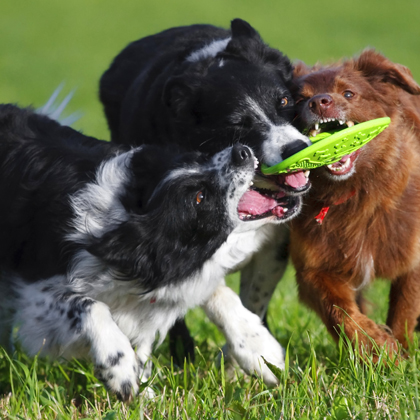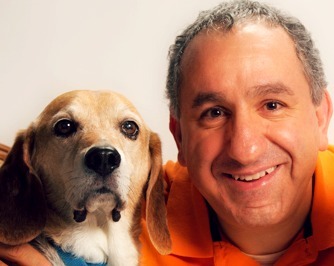Dogs are pack, social animals. Socialization is a genetic practice and is controlled by instinct. It is part of an animal’s survival skill. Without this skill, dogs will not be able to be part of a pack and will not be able to survive. An animal without its pack is usually destined to die early. In the wild if an animal does not have the social skills, it portrays a weakness; therefore it will be kicked out of the pack and left alone to survive, which usually does not have a happy ending. But since the necessity of socialization is in their genes, their instinct demands them to bond with its members and their environment.
Lack of socialization may make some dogs lose the will or the ability to live happy which can cause them stress and stress-related diseases. There are many reasons that can cause a dog to be lacking social skills but mainly can happen due to incorrect upbringing.
Some people do not allow their dogs to interact with other dogs at all and the dog does not seem to mind it. That is because the dog may get its socialization with humans mainly. The dog will do fine as long as there are no other dogs or unusual situations involved in its entire life. The dog will bond with humans instead. But it will be stressed out if one day the dog is needed to be involved with other dogs or situations where dogs are engaged.
When a puppy enters our lives, they automatically start to bond with the human and other members of that family including the other pets of the family. This is a natural phenomenon that happens but it takes time to develop a complete bond, trust and love with the members. It usually takes about a year.
A puppy, just like any newborn in this world, is pure and simple. All it wants to do is eat, sleep and play. Humans provide the eating (food) and sleeping (shelter) part of their lives very well, but they don’t provide the play (especially with other dogs’) part properly, which is one of the most important parts of a dog life structure.
To you and me, the play may look simply fun play, but it is more than that. It is the important structural part of building the personality, awareness and characteristics of a dog. First of all it allows your dog to start communicating with other dogs. This communication teaches dogs to learn how to speak dog language and gain social skills. The second part of the play is to be invited to the play by other dogs. This part allows your dog to be accepted in the animal world. The third part which is the physical part of the play allows the dog to gain survival skills and the mental part of the play which allows your dog to learn skills to solve problems. These skills not only improve the dog’s problem-solving in the world but also in general aspects of their lives which most of the times it includes humans and human society rules and more.
Puppies should have the opportunity to play, socialize and learn from other dogs especially from balanced adult dogs to gain knowledge and feel comfortable living among all kinds of dogs. Therefore it is important to socialize your puppy with puppies and balanced adults.
As dogs grow up and become adults they still need to practice their social skills. They need to be reminded that they still have to be comfortable and neutral towards other dogs. In many cases, dogs do pick up bad behaviours when not socialized properly because the owners have not taught their dogs the right response to certain behaviours or do not know dog body language. Socialization should continue throughout their lives.
Socialization should not be limited to dogs only. Streets, cars, people, birds, objects, sounds, other animals etc. are part of dogs’ lives and they should be included in the socialization exercises.
Most of the socialization should be done outside of the home, where dogs do not relate to anything. Home is a neutral environment. Home is where they eat, rest and sometimes belong to. Outside of the home is where they find food (at least in their mind), socialize with their surroundings, play and learn. When they come home, they are fed (again, in their mind they are fed off the daily hunt) as a reward and the work that they have done, then they rest for the next day. This is a natural way of allowing dogs to participate in a daily routine.
There are many reasons why people do not provide the situation for their dogs to socialize. I’ve come across many dogs and their owners who seek help after the damage is done and it is too late by not socializing their dogs properly. They expect their dogs to turn around and be social all of a sudden like nothing has happened in the past.
Here are some of the excuses that people have for not socializing their dogs:
We work at home so we can keep our dog at home with us.
This is a common assumption that people who work at home have. Just because you work at home doesn’t mean that your dog has to as well. They are not humans and dogs need to play, socialize and work outside of their homes. Home is where they eat and relax and play with their family members only. They should be socializing no matter what you are doing.
We have a big yard for my dog(s) to play and romp.
It doesn’t matter how big your yard is if there is nobody else but you and your dog(s) to socialize in it. Of course, if you have a few dogs, they are all social among themselves. Home is not where they can socialize with other dogs. They need to meet and a great many dogs in their lifetime.
We (our family) play and exercise our dog all day.
Human interaction for dogs is not enough. Dogs have to be involved with other dogs on a regular basis. Dogs need to have dog friends’ more than human playmates. They need to meet at least one new dog every week and interact with.
We are going to get (or we’ve got) a second dog for our first dog to play with and socialize.
It is not the number of dogs that you add to your family at home that is important; it is the amount of time your dog(s) gets involved with other dogs outside of the home.
But my dog (socializes) plays well with our neighbour’s dogs.
This is providing limited socialization and causes the dog to become selective. Of course, dogs will be okay to play and socialize with the dogs they know the most if given the opportunity, but what about the dogs that they have never met? How would they react to them?
We go to our local park and meet the same dogs all the time.
Once again this provides limited socialization. Expanding the socialization group will allow your dog to deal with the unknown and unexpected situations.
We go to local parks and we don’t see other dogs.
Then, drive and go to different parks.
—————————————————————————————————————————-
These are just some of the excuses, and trust me there are more. These excuses do not allow your dog to turn into a social, balanced dog.
To better understand what the above excuses mean when not allowing a dog to socialize, let’s use this example:
Just think about this. What happens when you tell a person; “here is a room with enough food, toys, and bedding etc. Go in there and live in it by yourself. We may add another person to keep you company, later on. We will see you in 5 to 10 years from now and hopefully, you will have all the social skills you need to survive the rest of your life and be normal.”
Do you expect a human to deal with this situation and be normal? Of course not. The same applies to dogs.
But, how do you socialize dogs? Here are some ideas:
•Simply, set your goal to allow your dog to meet 500 dogs over its lifetime. Not to only look at them from far, but to interact with them. Interaction means: sniffing each other, maybe engaging in play or some sort and having a positive outcome of the meeting.
• Dogs need to go for walks every day, rain or shine, whether you have a busy life or not. If you simply can’t walk your dog on a daily basis then you shouldn’t have a dog in the first place. Dogs need to move and travel every day (walk, sniff, mark, meet others, see things) to keep their minds occupied and active.
•Daily walks are the minimum required activity of a dog and it should be at least 30-45 minutes, depending on your dog’s energy level. The walk should be intense and filled with meeting dogs, training and playing.
•Take your dog for walks in the parks every day to meet other dogs and their owners. You and your dog will benefit from socializing with others.
•Socialization is crucial during the first 9 months of Puppy’s life and it should continue on a regular basis after this time.
•Take your dog to different parks. Don’t just stick to your neighbourhood park. If you live in North Vancouver, you can drive to hundreds of public dog parks. You can walk on a leash or off-leash your dog, as long as they are trained both on a leash and off-leashed.
• Don’t take the favourite toy or ball of your dog when going to the parks. Let your dog play and socialize with other dogs rather than its favourite toy. The toy can be played at home.
•Enrol your dog in a dog daycare/playcare that allows all kinds and sizes of balanced dogs to socialize with each other along with activities rather than just giving basic daily care.
•Invite dog friends to your place or go to theirs for birthday parties and such.
• Attend dog-related events such as agility or flyball trials, pet store demos, pet fairs to let your dog socialize with other dogs and people.
• Sign up for an obedience class. It is never too late to work on or refresh your dog’s obedience skills.
•Try to take your dog anywhere you can, walks, shopping, browsing stores and such.
Dogs are just like clay. They are ready to be moulded to whatever we shape them to be and they will accept it because they are loyal creatures to the point that they even stay loyal to abusive owners.
It is our responsibility to mould them into good dogs. Most aggressive and badly behaving dogs are that way because of their owners. You may have heard that “a bad dog is the result of a bad owner” and that is so true.
Mould them to the right shape and they will be happier and will thank you and love you even more than you hoped for. Dogs will be happier and healthier if we just were able to satisfy their needs. Socialization is one of the few requirements for dogs that help them become good dogs.
If we try to understand dogs and see the world from their point of view, we will have happier and healthier dogs. Let’s try to stop satisfying our needs when it comes to dogs or animals and help them to stay what they are while they spend their short lives with us. Animals were not created for humans, but to live among humans.





